When the World Stopped: How the Pandemic Shaped Regis
By Dave Francois
Five years ago, the world changed overnight. In March 2020, the COVID-19 pandemic forced universities, businesses and entire communities into lockdown. What began as a temporary disruption quickly became a defining chapter of our lives — one that reshaped education, work and human connection in ways we never could have anticipated.
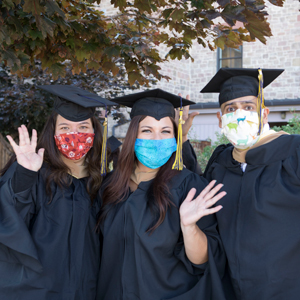
Regis University students celebrating commencement during the COVID-19 pandemic.
At Regis University, classrooms went dark, dorms emptied, and students and faculty scrambled to adapt to the new reality of remote learning and social distancing. The Jesuit value of cura personalis — care for the whole person — took on new meaning as the University sought to support students through uncertainty, isolation and grief. The fear was palpable, but so were moments of strength and grace.
Now, five years later, we reflect on what we have learned. The pandemic accelerated digital transformation in education, normalized remote work and exposed deep societal inequalities in health care and economic stability. Science advanced at unprecedented speed, with vaccines developed in record time, yet harmful misinformation spread like wildfire.
Today, as we navigate an era shaped by that crisis, lingering questions remain: How do we prepare for future pandemics? What did we lose — and what did we gain?
To answer these questions, we spoke with members of the Regis community who experienced the upheaval firsthand. Their memories paint a picture of confusion and adaptation, loss and resilience.
Responses have been edited for clarity and length.
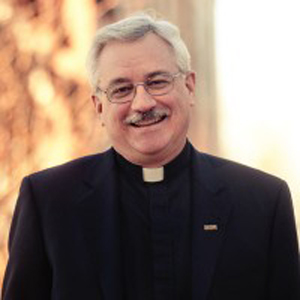
Father John Fitzgibbons, S.J.
President of Regis University 2012-2021
Regis Magazine: Let’s go back to March 2020, when it became clear that Regis would have to dramatically shift its operations. What were your initial thoughts, and how did you begin to process the impact on students, faculty, staff and the broader Regis community?
Father John Fitzgibbons, S.J.: Great question. I think it was like watching a train come down the tracks toward you. It was a little bit frustrating, because we didn't know how much this pandemic would affect us — but we knew it would — and we just didn’t really know how to address it.
One of the great helps was that the State of Colorado and all of the universities, public and private, would meet on a regular basis. The CEOs, the presidents, chancellors — we’d meet online and rehearse what the Department of Health in the state and the city, particularly Denver, would recommend and require. That was a good process — not just to get information, but also to unify our approach.
Another thing that really helped was how the central staff, the leadership of the University, pulled together. Not that we were separated before, but we worked together closely. With the appropriate physical distance, of course. We would meet regularly and update each other on where we were and what the directives were from the state and city health departments. We really did support each other and work through it.
RM: When it came to communicating with the Regis community, how did you and the rest of University leadership navigate that uncertainty?
JF: We had a fairly good communication system. We had to make decisions about what the president needed to say, and what the provost needed to say. We were blessed in having a provost who knew a lot about epidemiology. Her doctoral work was, I believe, in infectious disease. She wasn’t an epidemiologist, per se, but she was very, very familiar with the field.
So, we would take the information that we shared with the other universities and the Departments of Health, and parse that out quickly with the leadership team. The provost really took the lead on that. She was extraordinarily calm and insightful about how we were going to support our students and faculty.

Regis University's 2020 Commencement Ceremony
RM: As president of Regis during 2020 and 2021, in many ways you were the face of the University. It fell on you to project an image of calm, clarity and communication. What were the biggest challenges you faced during that time?
JF: I think it was actually a spiritual challenge. There’s the physical aspect — this was a horrible, highly infectious disease — but we didn’t really know, in the beginning, how to deal with it. Over time, we gained confidence and followed CDC and local health directives.
But morale was enormous. As president of a Jesuit university, you're the chief pastor, chief mission officer, the shepherd, the chief encouragement officer. You listen, empathize and then move forward with what we know and what needs to be done. It’s called practical love. We needed to care for one another and be patient. And I think that set a good tone.
If leadership becomes overwrought or short with people, then everyone else feels permission to do that too. Nobody's perfect, we all make mistakes. But I was very proud of the community. We rallied. We were not going to be beaten by this. We handled it well.
RM: Were there any moments of hope or resilience from the Regis community that stand out?
JF: The leadership team would meet regularly. The dean of Rueckert-Hartman [College for Health Professions] and the provost — who was previously the dean — really led those meetings. I would call them, but they were the subject matter experts.
We had a couple of new hires who, in good faith, questioned our approach. I was so grateful for how the dean and the provost received that pushback — with grace. They said, “You make a good point, but here’s the best way to proceed.” It was an extraordinary example of caring and leadership.
RM: What would you say to students who experienced the disruption of five years ago — who have since graduated, started careers or families, maybe moved away from Denver — and are now looking back?
JF: I’d turn the question around: What did you learn? What was your experience? Did you take the adversity and pain of that time and run it through the alembic of your soul — the distillery of your inner life — and reflect on what emerged? Did you learn about the importance of caring for others? Did you discover strengths and resources within yourself? Did you share those with others? Or did you hold back — and if so, what do you wish you had done differently?
Moments of crisis, of real tragedy, are opportunities for profound reflection. Saint Ignatius would ask us to do an examen, an examination of consciousness. What happened? How did your gifts, your hope, your will show up in that moment? Can you name the graces you received? Can you notice where you may not have responded as fully as you would have liked — and what you might do differently next time?
The examen is not about beating yourself up. It’s about being honest. What is real? And where was — and is — the grace of God in it all?
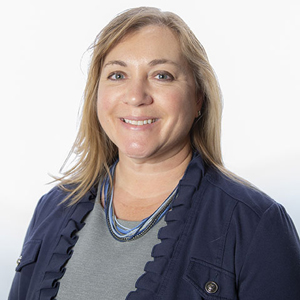
Stephanie James, Ph.D.
Professor of Pharmacy, Director of Research and Health Policy
Regis Magazine: As a professor and health care expert, what were your biggest concerns right off the bat when the pandemic began?
Stephanie James, Ph.D.: That was such a long time ago; it almost feels like a blur. But I think like most professors, my immediate thought was, “How am I going to pivot to online instruction?”
At the School of Pharmacy, we rely heavily on team-based learning to deliver content. Trying to figure out how to do that online felt really daunting. Zoom was still in its infancy for many of us — we were asking questions like, “Can we even put students into virtual breakout rooms?”
So, my first concern was how to maintain the quality and engagement of instruction. Then, like so many others, I was also trying to juggle homeschooling my own kids while teaching. That balancing act was overwhelming.
RM: Especially with such a hands-on teaching format like team-based learning, right?
SJ: Exactly. It’s very interactive and collaborative. Going virtual was a huge shift. But honestly, I think the School of Pharmacy faculty handled it with incredible grace. We met regularly, shared challenges and best practices — like how to administer quizzes or run group activities online. Everyone really supported each other.
And our students gave us a lot of grace, too. Even when technology failed or something didn’t go as planned, they were patient. Our lab faculty even put together take-home compounding kits that students picked up from driveways. It was really a team effort. And that summer gave us some breathing room to prepare for the fall more intentionally.
RM: How do you think the pandemic changed the role of pharmacists in the broader health care system? And do you think those changes are here to stay?
SJ: Well, I say this as a Ph.D., not a Pharm.D. — but I think one of the most significant changes was the spotlight on pharmacists during the vaccine rollout. Before that, people knew pharmacists could give flu shots, maybe shingles vaccines, but COVID really elevated their role as health care providers. They weren’t just dispensing medications; they were conducting clinical assessments, administering vaccines, even dispensing Paxlovid based on evaluations.
So, I think the public gained a new appreciation for their expertise. Some would argue pharmacists are underutilized in our system, even though they're incredibly well-trained. They are, truly, the medication experts.
RM: Looking ahead — beyond COVID — what emerging public health challenges do you think pharmacy professionals will be key players in?
SJ: I really see community pharmacy as the front line of health care. Most people go to their pharmacy before they ever schedule a doctor’s appointment. That gives pharmacists a unique pulse on public health trends.
If there’s another outbreak — and there will be — pharmacists will be key again. They’re embedded in communities, accessible and trusted. They’ll be running pop-up immunization and treatment clinics, just like during COVID. That trust and proximity are invaluable.
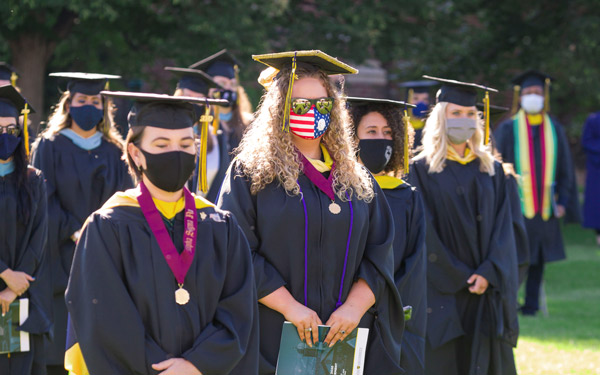
Regis University's 2020 Commencement Ceremony
RM: Can you talk to us a little about running the COVID testing lab on campus in the early months of the pandemic?
SJ: It was the craziest thing — I’d teach online during the day, and then many nights I’d come to campus and run COVID tests in the lab. That was more intense than anything else. It started in the summer of 2020, when we were preparing for fall and knew that some classes would be remote, some held outdoors, and students would be returning to the residence halls. And at that point, there was no vaccine yet.
It was Janet Houser, the provost at the time, who called me and asked, “What can we do? Can you help Student Health with testing?” Out of pure naivete, I said, “Well, it’s just a PCR test — I can do that.”
I had no idea what I was signing up for. We knew that sending tests out to public health labs would take seven to ten days — or longer — to get results. That just wasn’t acceptable if we were going to have students living in close quarters. So, we created our own CLIA-certified testing site right in the School of Pharmacy, using our pharmaceutical research lab. Student Health would collect nasal swabs from students and faculty and bring them to my lab, where I would run PCR tests that night and report the results within 24 hours.
That quick turnaround was critical. When someone tested positive, we didn’t have to wait to isolate or quarantine them. I really believe that helped us prevent larger outbreaks on campus. But it was a heavy lift — working with Student Health and Legal and doing all of this on top of my full-time faculty job.
We had pharmacy students giving vaccines, nursing and PT students doing observation and patient counseling, faculty managing the lines and Campus Safety helping with logistics. It was a full community effort.
RM: Switching gears a bit — from the pandemic to broader health care policy. What do you think the pandemic revealed about the strengths and weaknesses of our public health system?
SJ: What we went through was a public science experiment, and it became painfully clear how many people don’t understand how science works. That lack of understanding bred distrust. Science is iterative — we make the best decisions based on available data. And when new data comes in, we adjust. But those revisions were seen by some as incompetence or even deception.
Advice changed — on masks, on vaccines — because the situation evolved. Supplies changed. Knowledge grew. But it became political fodder, and that was incredibly frustrating.
RM: In that vein, is there anything you wish the public had a better grasp of when it comes to science and public health?
SJ: Honestly, I wish more people understood how early we still are in understanding this virus. COVID may feel old, but virologically, it’s still a baby. Look at HIV — we’ve been studying it for decades and are still learning.
COVID isn't going away. It will remain part of our lives. And while it's natural to want to put it in the rearview mirror, we’re still learning. Still taking baby steps. Vaccines are a perfect example: at first, we thought preventing disease pathology would stop transmission — but it turns out you can still carry and spread the virus even without symptoms.
That’s the nature of emerging science. And I hope people can develop more patience — and curiosity — about that process.
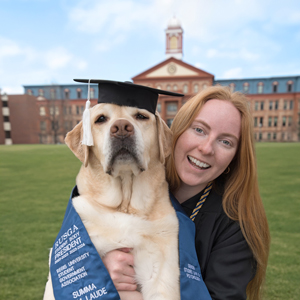
Madelaine Johnson, ’24
Regis Alumna, Student Body President 2022–24
Regis Magazine: Can you take us back to Spring 2020? Where were you when you realized everything was about to change?
Madelaine Johnson: It was my senior year of high school. We were all getting ready for graduation. Everyone was hearing back from colleges, figuring out where we were going. Right before the shutdown, I had actually just done a campus tour at Regis for Scholarship Weekend. It was such a cool experience — I got to meet other students and started imagining what my college life might be like. And then, that next weekend, everything went remote.
I was in the middle of trying to decide where to go to school. I had received my financial aid packages from other universities, and Regis just wasn’t in the budget. I’m a first-generation student from a single-parent household, and I remember calling my admissions counselor at the time and telling her, “I’m really bummed — I don’t think I’ll be able to come.”
And she just said, “We’ll make it work. We want you here.” And they did. They made it work. And honestly, it was the best decision I ever made.
That weekend before the shutdown, everything still felt normal. And then suddenly, it wasn’t. My [high school] class didn’t have an in-person graduation — it was all virtual. So, when I finally got to walk across the stage [at Regis] last year, it meant so much.
RM: What was the social aspect like? The first year of college is often such a big social time — meeting new friends, joining clubs, going to events. How did your expectations shift, and how did things compare once you finally made it to campus?
MJ: I’m such a social person, so not having that typical college experience was hard. That’s actually a big reason I wanted to join student government later on — I really wanted to help create those experiences for others.
That first year, though, I was grateful for the extra time at home. It gave me space to be with my family, and I think that was really valuable. But I still wanted to connect, so after class, I’d email students whose comments stood out to me and say, “Hey, that was a great point — here’s my number, let’s chat.” And we’d set up Zoom coffee dates. Even though we were apart, we were trying to reach out. It felt like we were all just navigating this weird, distanced version of community.
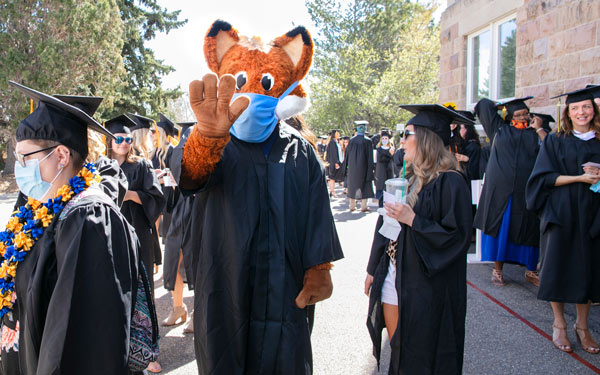
Regis University's 2021 Commencement Ceremony
RM: You served as student body president from 2022 to 2024. Do you think the pandemic shaped your leadership style? And if so, how?
MJ: Absolutely. After the pandemic, there was such a broader conversation around mental health. We became so aware of how much isolation affected people — especially young people.
So, when I stepped into leadership, my team and I leaned hard into the Jesuit value of cura personalis — care for the whole person.
There was this hesitancy we saw on campus. People were back in person, but some still weren’t sure — “Do I go to this event? Do I stay in my room?” We wanted to encourage people to rebuild those connections — but in a gentle, supportive way. I think that’s where our leadership really tried to shine.
RM: Most undergrads today were still in high school during the pandemic — or maybe just starting college. What do you think they might not fully understand about being a college student during those early pandemic years?
MJ: You should ask my sibling! They’re actually a sophomore at Regis now, and it’s been really cool to share that college experience together — my senior year, their first year.
What I’ve noticed is that today’s students are a lot more ready to jump into things. Right after orientation, they’re already finding their friend groups, joining clubs and figuring out their favorite study spots. There’s a real sense of social motivation. I think that’s partly because, during the pandemic, we lost some of that communal energy. Now, we’re seeing it rebuild. Last year’s freshman class was the biggest in a while, and I think people are rediscovering that Regis identity — who we are, what brings us together.
RM: Looking back, how do you think the experience changed you personally?
MJ: I’m incredibly grateful that Regis is a smaller community. That closeness was a saving grace. You’re not just a number — you really get to know people, in your classes, in the dorms. Everyone was there for each other in ways we didn’t even realize we needed. And I had friends across so many different majors and clubs — that diversity of perspective made us stronger.
We were motivated by service and by that Jesuit value of being for and with others. We were all trying to build something — to find a home away from home, together. That’s something you can only get in a community like Regis.
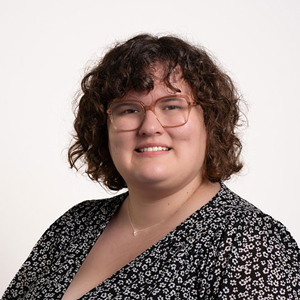
Hadley Jenkins, ’24
Regis Alumna, Regis Marketing and Communications Staff
Regis Magazine: As a graduating high schooler and first-year Regis student in 2020, how did the shutdown affect your introduction to college life?
Hadley Jenkins: It was actually the fall of 2019 when I decided I wanted to go to college, so it was a quick turnaround. But it wasn’t what I expected. I thought I’d get to move out, meet people, find my place. But I ended up moving back home after my first semester because I was driving home every weekend. I felt so alone.
Online classes were tough. As someone who's had asynchronous classes ever since the pandemic, I can say it’s not a great way to start college — or to start learning in general. It’s hard to focus. I wish I could redo some of those first-year experience courses — just to connect with people better. I’d recognize faces later, but I didn’t know anyone. Everything was through a screen.
RM: Do you feel like your overall college experience was permanently shaped by the pandemic? And if so, how?
HJ: Definitely. One thing is that professors don’t really cancel class anymore. If the weather’s bad or whatever, it's like, “Well, we can just go on Zoom.” So, I felt like I was in class more than students who graduated before me. They’d talk about snow days, and I’d be like, “What’s that?”
There was also this ongoing anxiety about health and wellness on campus. You can still see remnants of that — like the six-feet-apart floor stamps. And the way social and student engagement activities were organized — it changed a lot. Everything had to be smaller or more carefully planned out for a long time. It slowly went back to “normal,” but it definitely shaped those first couple years.
RM: Is there a particular moment or detail from 2020 that stands out to you — something that really encapsulates that whole experience?
HJ: I started my first retail job in May 2020 — at Joann Fabrics, actually, which is now going out of business. I mostly remember the masks — and how unheard I felt. I have mild face blindness, so I rely on seeing people’s full expressions to understand them. I missed a lot of social cues. Customers were angry and frustrated, and we couldn’t understand each other fully.
That stuck with me — the communication breakdown and how bad I felt, even though it wasn’t my fault.
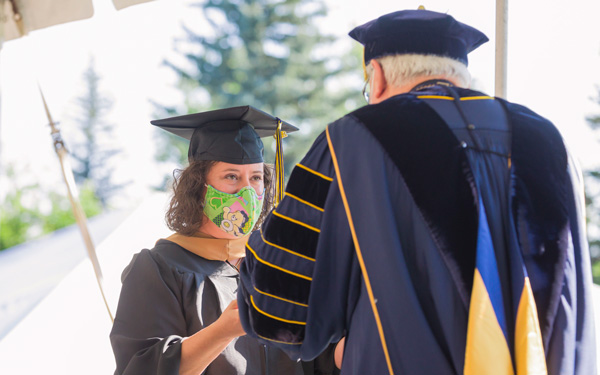
Regis University's 2020 Commencement Ceremony
RM: You’re now a staff member on the Regis Marketing and Communications team. Do you see any lasting impacts of the pandemic on how the university communicates with students?
HJ: Oh, definitely. Alongside budget changes that I’m now more aware of as an employee, there’s way less physical mail or printed materials. And students seem less inclined to go to physical events. Maybe it’s because we’ve proven that virtual or asynchronous events can work — or maybe expectations have shifted.
I also think the way we tell stories has changed. We’re still in this sort of “redemption arc” after COVID, where we frame things as, “Since the virus, we can now do X.” But like you said — it’s been half a decade. When do we stop framing everything around COVID? Is it the past, or is it something we continue to use to shape the future?
RM: If you could go back in time and give advice to your first-year self about what was coming — what would you say?
HJ: There’s so much I’d say. One big thing: the loneliness and isolation you’re feeling — it’s temporary. My parents kept telling me that, but I couldn’t see it. I had no frame of reference. If I could have described what “okay” would actually look like, maybe I wouldn’t have felt so overwhelmed or hopeless. Maybe I would’ve picked a major earlier or been more open to meeting people.
Back then, it was just a mix of things — my anxiety, the pandemic — that made me withdraw. I’d tell her: it gets better. Really.
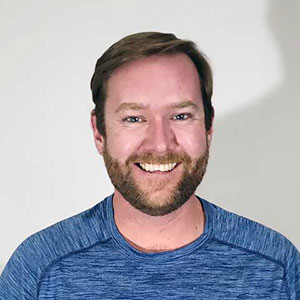
Article by Dave Francois
About the AuthorMore from this issue
Share Your Thoughts
Email us or write in to the Regis University Magazine at 3333 Regis Blvd, L-27, Denver 80221
